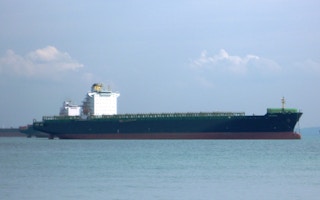Neptune Orient Lines Group (NOL) is turning a welcome shade of green. From today, its shipping line – APL – will be the first line to make the switch to low-sulphur fuel in Singapore.
All 80 of its vessels calling at Singapore will begin using low-sulphur marine gas oil instead of regular marine fuel. NOL announced this move at the launch of the Maritime Singapore Green Initiative yesterday.
The marine gas oil it is using has an average sulphur content of 0.25 per cent, a concession to a green shipping mandate that is nine years ahead of deadline.
Singapore has adopted the International Maritime Organisation’s deadline that calls for reducing the sulphur content of marine fuel to 3.5 per cent by 2012 and to 0.5 per cent in 2020.
‘We are proud to be the first container shipping line to convert to cleaner-burning fuel here,’ said Eng Aik Meng, president of APL. ‘As Singapore’s largest carrier, we feel a responsibility to manage the environmental impact of global trade.’
The switch will cut sulphur oxides emissions by 90 per cent and nitrogen oxides emissions by about 12 per cent, NOL said. Ash and particulate matter emissions could be cut by 80-90 per cent.
This low-sulphur path comes at a price. Marine gas oil is almost double the price of regular marine fuel. According to Mr Eng, APL’s fleet burns 11,000 tonnes of fuel per year while in Singapore’s port. ‘There is a cost, but it is worth it,’ he said yesterday.
There are no immediate plans to pass on the additional cost to its customers, the group said.
At the launch of the initiative, both Maersk Line and Pacific International Lines (PIL) indicated that they too would switch to low-sulphur fuel for ships calling here soon.
When asked if Singapore is on the list of at least 10 locations in the world where Maersk had committed to making the switch to low-sulphur fuel by 2015, Thomas Knudsen, Maersk Line’s chief executive for the region said: ‘You can expect that, yes.’
‘We definitely will be looking more at using low-sulphur fuel for ships calling at Singapore,’ said Teo Choo Wee, PIL’s executive director for the fleet division.
Singapore is the seventh city in which APL has switched to the cleaner-burning alternative. It began four years ago in Los Angeles and Seattle, before moving on the cities like Hong Kong and New York.
‘We greatly welcome APL’s decision to switch to using low sulphur fuel in Singapore and hope that more shipping companies will follow APL’s lead in doing so,’ said Lam Yi Young, chief executive of the Maritime and Port Authority of Singapore.

















